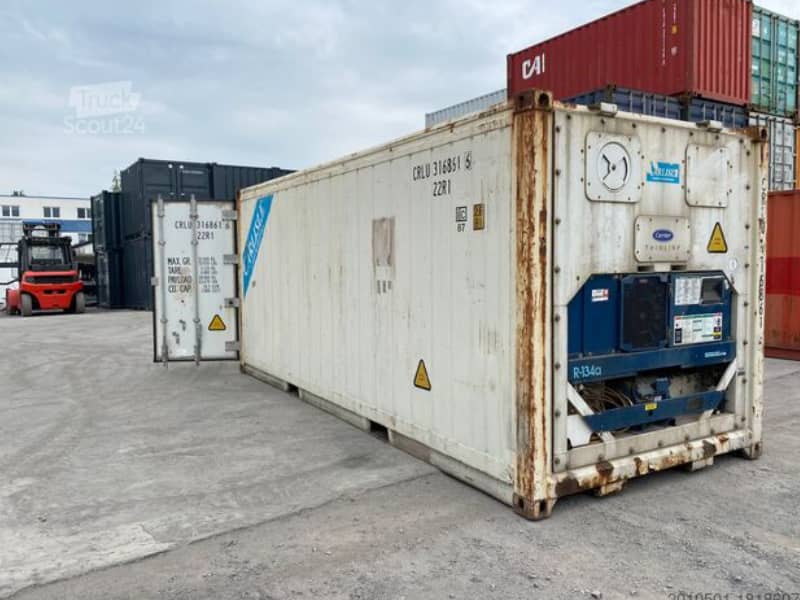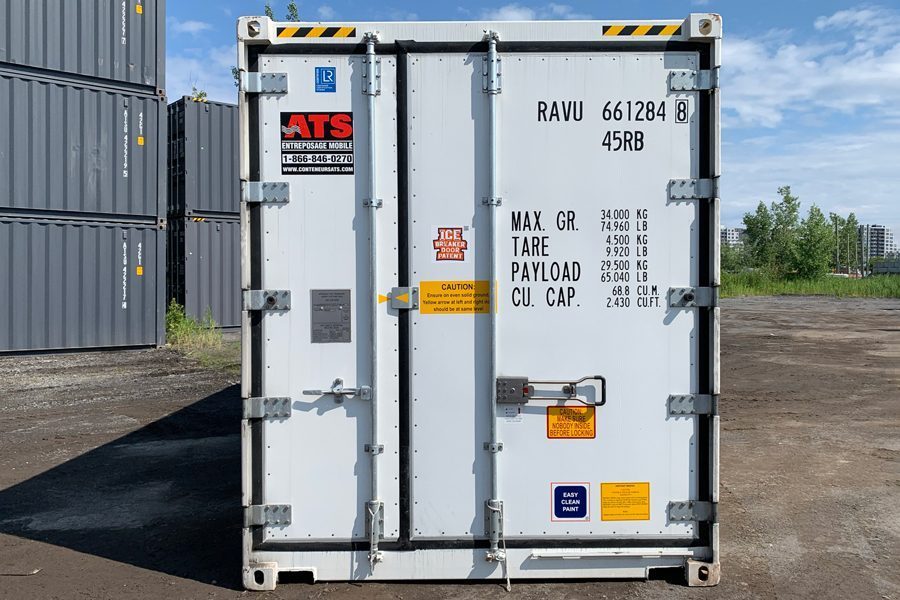All Regarding Cold Storage Containers: Necessary Insights for Your Storage Space Requirements
Cold storage space containers play a vital role in the conservation of subject to spoiling products. They are available in different types, including chilled and insulated devices, each developed for certain storage needs. Comprehending the advantages and crucial features of these containers is important for organizations aiming to enhance their procedures. As the demand for effective storage space services grows, discovering the different choices offered can cause informed decisions that impact both success and sustainability. What factors should one consider when picking the best container?
Types of Cold Storage Containers
Cold storage containers come in various kinds, each created to meet particular temperature level control requirements. Among the most typical types are refrigerated containers, which preserve temperatures in between 0 ° C to 10 ° C, making them suitable for perishable items like fruits, vegetables, and milk items. Another type is the deep freezer container, which operates at temperature levels listed below -18 ° C, ideal for long-term storage of icy things such as meats and seafood.
Insulated containers supply temperature security without energetic air conditioning, making them useful for temporary transport of temperature-sensitive products. In addition, there are portable cool storage devices, which offer adaptability in locations and are frequently used in occasions or seasonal operations. Blast chillers quickly reduce the temperature level of warm foods, guaranteeing safety and security and high quality. Each kind serves a distinct purpose in various sectors, from food service to drugs, highlighting the relevance of selecting the appropriate container for details storage demands.

Benefits of Using Cold Store Solutions

Cold storage space remedies prolong the rack life of things, lowering waste and increasing earnings for organizations. By successfully managing supply with appropriate temperature level control, firms can maximize their supply chains and improve operational effectiveness.
Furthermore, cold store facilities permit adaptable storage options, suiting numerous quantity requirements and seasonal changes popular (used 40ft refrigerated shipping containers). This flexibility aids companies respond rapidly to market changes
Last but not least, employing freezer solutions can ensure conformity with health and security regulations, securing both businesses and consumers. Generally, the critical usage of cold store enhances product monitoring while promoting sustainability and economic practicality.
Key Features to Try To Find in Cold Store Containers
When choosing freezer containers, numerous key features value careful factor to consider to safeguard peak efficiency and reliability. First, temperature control abilities are necessary; containers should preserve constant temperatures suitable for particular goods. Insulation quality additionally plays a substantial duty, as premium insulation minimizes power usage and enhances temperature security.
Next off, simplicity of gain access to and loading is vital; containers must provide easy to use designs for efficient handling and organization. Resilience is one more important aspect; weather-resistant products guarantee longevity and safeguard contents versus ecological factors.
Furthermore, mobility functions, such as built-in wheels or raising points, assist in transport, while adjustable formats enable tailored storage space options.
Keeping track of systems, consisting of temperature level alarm systems and remote monitoring, give real-time updates, making certain that conditions remain ideal. By focusing on these functions, customers can select chilly storage containers that meet their operational demands efficiently.
Choosing the Right Cold Store Container for Your Demands
Choosing the best freezer container needs a thoughtful analysis of specific requirements and functional needs. Elements such as the sort of products being kept, temperature level sensitivity, and volume needs to be prioritized. For instance, subject to spoiling food things may require containers with rigorous temperature level controls, while pharmaceuticals may require accurate problems to preserve efficiency.
In addition, prospective customers should take into consideration the container's size and wheelchair. A larger system may be necessary for mass storage, while smaller, mobile options might be excellent for on-site or short-term demands. Insulation high quality and power effectiveness are likewise vital, as these will influence functional costs and temperature security.
Conformity with industry regulations and criteria is vital, specifically in sectors like food and healthcare. great post to read By meticulously examining these aspects, customers can select a freezer container that successfully meets their unique demands and warranties ideal storage space conditions.
Ideal Practices for Preserving Cold Storage Conditions
Maintaining optimal freezer conditions is necessary for preserving the Continued top quality and safety of temperature-sensitive products. Regularly keeping an eye on temperature and humidity degrees is essential; utilizing trustworthy electronic thermostats and hygrometers can supply accurate readings. In addition, appropriate insulation of cold storage containers aids minimize temperature level variations and power loss.
Applying a first-in, first-out (FIFO) system guarantees that older stock is utilized prior to more recent stock, lowering waste (used 40ft refrigerated shipping containers). Additionally, keeping an organized layout within the storage room enables better air flow and lessens the risk of cross-contamination
Routine maintenance examine equipment, such as compressors and seals, are necessary to protect against malfunctions. Team training on finest practices for packing and unloading products assists maintain temperature level honesty. Maintaining doors closed as much as possible limitations warmth exchange, assuring that the cold storage space setting continues to be secure and reliable in maintaining valuable items.
Price Factors To Consider for Freezer Solutions
When reviewing freezer options, it is vital to take into account the initial financial investment expenses along with ongoing operational expenditures. A thorough failure of these costs can expose substantial long-term financial savings possibility for businesses. Recognizing these monetary elements assists stakeholders make informed decisions concerning their freezer demands.

Initial Investment Prices
The economic landscape of cold store containers presents numerous preliminary financial investment costs that businesses have to consider. These prices generally include the acquisition or rental rate of the containers, which can vary based on size, type, and insulation quality. Additionally, expenditures related to retrofitting existing structures to suit chilly storage space needs to be factored in, specifically if specialized devices is required. Installation costs, consisting of electrical work and refrigeration systems, likewise contribute to the general preliminary investment. Organizations ought to not neglect transportation prices for delivering containers to their wanted place. Possible personalization alternatives, such as shelving or temperature monitoring systems, can additionally impact the first financial expense. Careful budgeting for these variables is necessary for successful cold storage space application.
Operational Expenditures Break Down
Functional expenditures for chilly storage remedies include several crucial expense considerations that businesses have to browse. Secret variables consist of energy costs, which can be significant as a result of the requirement to maintain reduced temperatures. Maintenance expenses are likewise significant, as routine servicing is necessary to assure devices operates effectively and continues to be compliant with health and wellness criteria. In addition, labor expenses may occur from the requirement for specialized team to check the storage space and manage environment. Insurance coverage costs are an additional factor to consider, as firms must shield their investments against potential losses. Any potential regulatory compliance costs should be factored in, as organizations might require to spend in systems that adhere to food security and environmental policies. Comprehending these expenditures is critical for efficient budgeting.
Long-Term Savings Potential
Investing in cold store remedies provides substantial long-term cost savings capacity, changing preliminary expenses into financial efficiency over time. By reducing putridity and waste, services can improve their revenue margins significantly. Advanced insulation and energy-efficient systems minimize energy prices, which gather over the lifespan of the equipment. Additionally, cold store check this containers typically call for less frequent maintenance contrasted to standard refrigeration approaches, resulting in lower fixing expenditures. The capability to store products for extended durations without jeopardizing quality permits organizations to profit from market fluctuations, enhancing revenue. Furthermore, the scalability of freezer options enables firms to adjust to altering demands without incurring excessive prices. Overall, these elements contribute to a compelling case for chilly storage space as a cost-effective financial investment strategy.
Regularly Asked Questions
How Much Time Can Food Be Stored in Cold Store Containers?
The period food can be saved in freezer containers varies by type. Typically, disposable items last from days to weeks, while icy foods can remain safe for months, depending on proper temperature level and storage conditions.
Are Cold Storage Containers Energy-Efficient?
The energy efficiency of cool storage containers varies based upon layout and insulation high quality. Modern systems frequently make use of sophisticated innovation to reduce power consumption, eventually contributing to minimized operational costs and environmental impact in long-term use.
Can Cold Storage Containers Be Personalized for Details Demands?
Cold store containers can undoubtedly be customized to satisfy specific needs. Adjustments might include temperature level controls, size changes, and extra functions, allowing users to customize services successfully for numerous storage space needs and functional preferences.
What Are the Typical Sizes of Freezer Containers?
Cold storage containers generally can be found in basic dimensions such as 10, 20, and 40 feet. These measurements accommodate different storage demands, ensuring flexibility for businesses requiring temperature-controlled atmospheres for delicate materials or perishable items.
Do Freezer Containers Require Special Authorizations for Use?
Cold storage containers commonly call for unique authorizations for usage, depending upon regional guidelines and intended applications. Authorities might mandate licenses to ensure safety criteria, ecological conformity, and correct functional practices are kept during their utilization.
Cold storage space containers come in different kinds, each created to satisfy particular temperature control requirements. Additionally, chilly storage space centers allow for flexible storage alternatives, suiting numerous volume needs and seasonal fluctuations in need. Selecting the best cool storage container needs a thoughtful assessment of operational requirements and specific needs. The economic landscape of cold storage containers provides numerous preliminary investment prices that services must think about. Cold storage space containers can certainly be customized to satisfy specific demands.